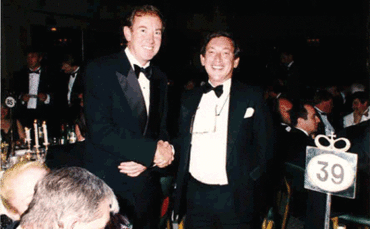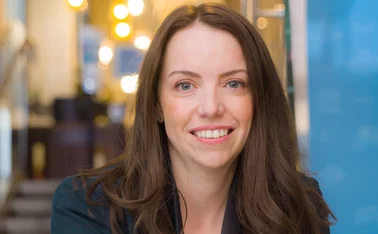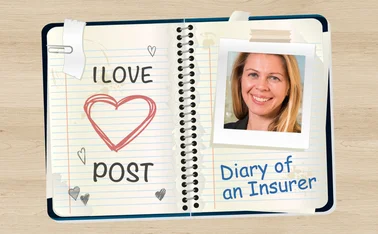
BIA Countdown: Achievement winner reflects: Q&A with Peter Wood

Since their inception, the BIA have become the unrivalled badge of excellence for the insurance sector, raising standards across the industry through their showcasing of best‑of‑breed performance and innovation.
This year, with 25 categories recognising the cream of British insurance, we are proud to continue the legacy of the BIA in this special 20th anniversary year. To celebrate this momentous occasion, Post will be speaking to previous winners about their opinions on how the industry has changed over the past 20 years, as well as asking them to share their best BIA memories.
Peter Wood is something of a legend in the insurance industry. After what he calls a “short but useful” career in the IT industry, he launched Direct Line – the UK’s first telephone-only insurer – in 1985, in conjunction with Royal Bank of Scotland.
He left the business and went on to found Esure, which he floated for £198m last year. He has also set up insurance businesses abroad, and last year the Sunday Times Rich List estimated his personal fortune at £500m. He won the first ever Achievement Award in 1995.
CV: Peter Wood
2013
Floats Esure Group on the London Stock Exchange with a valuation of £1.3bn
2010
Leads management buy-out of Esure following takeover of HBOS by Lloyds Banking Group
2005
Creates the Sheilas Wheels brand
2000
Founds Esure with Halifax
1998-2004
Non-executive director of Economist Group
1998
Sells stake in Privilege Insurance for £10m
1997
Sets up Homesite, a US household insurance company
1996-2000
Non-executive director of Centrica
1996
Awarded honour of Commander of the British Empire
1996
Sets up Privilege Insurance with Royal Bank of Scotland
1995
Sets up Direct Response Corporation, a US insurance company
1985
Founded Direct Line with backing from Royal Bank of Scotland
1973
Head of global data processing for Alexander Howden
Pre-1973
Computer programmer for Henry Schroder Wagg, Whitbread, Levi Strauss
1. You have founded seven insurers in three countries, but what would you say is your biggest achievement?
It’s very hard to look back over nearly 30 years and have a balanced view but, in retrospect, I believe it was the creation of direct telephone insurance. At the time, it was an alien idea to both insurers and consumers. There were times when I had to lock the door and kick a toy cat I used to keep in my office (I’ve still got it) out of frustration, but once consumers bought into a new way of doing things, it gained its own momentum and the world changed. I’m proud of that, and I believe the consumer was the greatest beneficiary.
2. How has the face of insurance changed since you won the first ever Achievement Award?
There are so many big themes: the internet, aggregators and changes in distribution. Then there’s the low interest/low return financial environment, and the need for insurers to be excellent underwriters – not just good investors. Also, the effects of regulation: insurers are caught up in similar regimes to banks, despite the fact we remained strong during the financial crisis. Finally, fraud, whiplash and the rise of a dangerous UK personal injury culture over the past 10 years. These have changed the fundamental basis of the motor insurance market.
3. What have been the biggest challenges to the industry over the past 20 years?
For the industry as a whole, regulatory change is right up there. Compliance takes up resource, but it also about getting the right attitude among staff – so it is cultural as well as technical and financial. Beyond that, although products remain very similar to 20 years ago, it is distribution and marketing that seem to change character every five years, which can be a challenge – unless you’re creative.
4. How has the rise of technology affected insurance?
Internet distribution changed it massively. But in the last few years, the social media, ‘internet in my pocket’ phenomenon has started to affect insurers – both positively and negatively. [On the positive side], some of the fraud detection technologies that can now store and process billions of records in minutes are having a profound effect on the industry.
5. Direct Line pioneered selling insurance direct to consumers. What’s your view of the direct market now?
Is there a direct market like there was during the high points of the 1990s? I don’t think so. People now choose the channel that suits them – and sometimes interact with insurers through multiple channels simultaneously. Direct players have to adapt and evolve constantly, you can no longer be just one thing.
6. What has the impact of fraud been on the insurance industry? How has fraud changed over the past 20 years?
Like death and taxes, fraud is inevitable. As insurers get better at stopping the current fraud hotspots, fraudsters find new ones. However, we have seen a marked shift from opportunistic to organised fraud. The opportunist can be caught easily, but gangs and rings are like businesses: they invest and develop. We just have to match them.
7. You have a 50% stake in Go Compare. What do you think aggregators bring to the insurance market?
Choice, convenience and transparency. But aggregators did not create their market. They simply started to offer a new level of pricing transparency to customers, who welcomed the convenience. Consumers can [now] pass over all the work and time they had to invest previously to price comparison providers. Distribution will always continue to evolve, but it is the ultimately the customers who drive it with their choices.
8. What impact do you think being owned by RBS has had on Direct Line?
Very little, when I was there – it became the world’s most efficient insurer at one stage. After me – no comment!
9. How has regulation, such as Solvency II and the gender directive, affected the insurance industry?
No one loves regulation for regulation’s sake and the costs are high and getting higher. Good can come from regulation – particularly for customers
– but it only tends to have an effect on those who were not very customer-focused or well run in the first place. For efficient customer-focused companies, the benefits are relatively small but the costs high.
10. How was Sheila’s Wheels affected by the Gender Directive?
Although we fundamentally disagreed with the European Court of Justice’s findings – and believe the move to gender neutral pricing is simply unfair to women in the motor insurance market – the fact that Sheilas’ Wheels was so large when the ruling came in was something of an advantage for us. It enabled us to retain existing customers because our brand is already female dominant. No-one else could now build a Sheilas’ Wheels in an equally priced world, so we have a unique advantage.
11. Direct Line had the first call centre in the UK – do you think new ways of communicating with consumers, such as via apps and online, are the future?
All sorts of new ways of communicating and engaging with customers are being developed almost weekly, but I believe that each [new tool] will simply provide supplementary ways for insurers to deliver services. Customers will simply choose what suits them best at the time. Some channels will shrink and others will grow, but there are pitfalls in being either too narrow or too broad.
12. Why is insurance a great industry to work in?
Sometimes it isn’t but that’s often the influence of those who don’t really understand what we do. It is an industry that provides a service that supports society in a fundamental way. It takes the risk away from the ordinary man and woman. It also creates and sustains hundreds of thousands of jobs in the
British economy.
13. Where do you keep your Achievement Award?
Since you asked this question, I’ve been trying to find it!

14. What is your best memory of the BIA?
Getting out alive. You have to remember that it was a bold choice to give this award to the man who started the direct insurance revolution, given the number of brokers in the room. Andrew Paddick [director general of the Institute of Insurance Brokers] – a man many of your readers will remember – was there, and he was nice to me. These days, those rivalries between direct providers and brokers have largely healed as we all face the same challenges.
15. What do you see as the future for professional training and development for the insurance industry?
We will need more specialists but also more strategic generalists. We need to take people back to the very simple basic principles of insurance. People forget this is an industry where customers part with hard-earned money for something that many don’t believe they will ever use – then we pay their claims efficiently when [something happens]. The public often forget that insurers pay out most of the premiums they take in to ordinary people.
Only users who have a paid subscription or are part of a corporate subscription are able to print or copy content.
To access these options, along with all other subscription benefits, please contact info@postonline.co.uk or view our subscription options here: https://subscriptions.postonline.co.uk/subscribe
You are currently unable to print this content. Please contact info@postonline.co.uk to find out more.
You are currently unable to copy this content. Please contact info@postonline.co.uk to find out more.
Copyright Infopro Digital Limited. All rights reserved.
As outlined in our terms and conditions, https://www.infopro-digital.com/terms-and-conditions/subscriptions/ (point 2.4), printing is limited to a single copy.
If you would like to purchase additional rights please email info@postonline.co.uk
Copyright Infopro Digital Limited. All rights reserved.
You may share this content using our article tools. As outlined in our terms and conditions, https://www.infopro-digital.com/terms-and-conditions/subscriptions/ (clause 2.4), an Authorised User may only make one copy of the materials for their own personal use. You must also comply with the restrictions in clause 2.5.
If you would like to purchase additional rights please email info@postonline.co.uk







